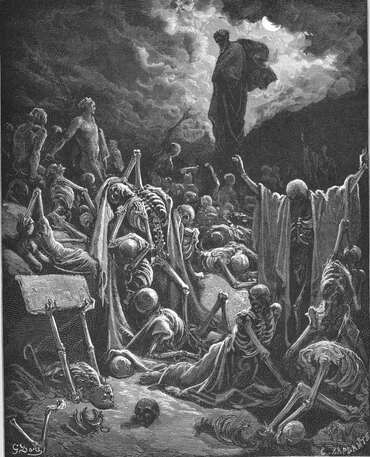9479. 'And they are to make Me a sanctuary' means a representative of the Lord, and so of heaven. This is clear from the meaning of 'a sanctuary' as the Lord and as heaven, but at this point a representative of the Lord and heaven, since it was a tabernacle made of pieces of wood and covered all over with curtains, and this could not have been a sanctuary but for its representation. For 'a sanctuary' means holiness itself; and nothing is holy except what is Divine, thus the Lord alone, 9229. The reason why heaven is a sanctuary is that heaven is heaven by virtue of what is Divine there. For the angels there, so far as they draw on what is Divine and the Lord's, constitute heaven; but so far as they draw on what is their own they do not constitute heaven. From this it is evident how the saying that the Lord is the All in all of heaven should be understood. For the Lord dwells with angels, and so in heaven, in what is His own, thus in what is Divine, see 9338 (end).
[2] The fact that 'a sanctuary' in the highest sense means the Lord, because He alone is holy and that alone is holy which emanates from Him, and also the fact that 'a sanctuary' means heaven, and the Church as well, and that sanctuaries are those realities of which the Lord is the source in heaven and the Church, is clear from places in the Word where the words 'sanctuary' and 'sanctuaries' are used, as in Ezekiel,
The Lord Jehovih has said, I will scatter them into the lands, and I will be a little sanctuary for them in the lands to which they will come. Ezekiel 11:16.
Here 'a sanctuary' stands for the Lord Himself, for 'the Lord Jehovih' and 'Jehovah' in the Word mean the Lord, 9373. In Isaiah,
Look out from the heavens, and see from the dwelling-place of your holiness and of Your glory. Isaiah 63:15.
In Jeremiah,
Like a throne of glory, a height from eternity, [is] the place of the sanctuary. Jeremiah 17:12.
In these places 'the dwelling-place of holiness' and 'the sanctuary' stand for heaven.
[3] In Isaiah,
But a little while, and they have possessed the people of Your holiness; our adversaries have trodden down Your sanctuary. Isaiah 63:18.
In Jeremiah,
The nations have come into His sanctuary. Lamentations 1:10.
In the same book,
The Lord has abandoned His altar, He has abominated His sanctuary. Lamentations 2:7.
In Ezekiel,
The Lord Jehovih has said, Behold, I am about to profane My sanctuary, the pride 1 of your strength, the desire of your eyes. Ezekiel 24:21.
In Moses,
I will make your cities a waste, and desolate your sanctuaries. Leviticus 26:31.
In these places 'the sanctuary' stands for the Church, and 'sanctuaries' for things belonging to the Church. From all this it is clear how the tabernacle comes to be called the sanctuary, namely from the fact that heaven and the Church were represented by the tabernacle, and the Divine realities of which the Lord is the source in heaven and in the Church were represented by the holy things there.
Poznámky pod čarou:
1. literally, magnificence







